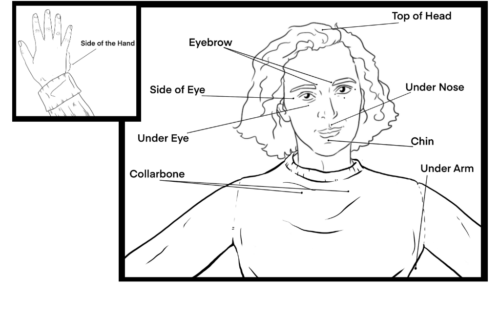
EFT for Self-Care Guide To Getting Started
WHAT’S UP: EFT for self-care is about making your health and well-being needs a high priority. Also known as Tapping, EFT has been around for more than 40 years and researched now for more than 20 years.
The 250+ published journal articles on EFT show it positively affects a range of biochemistry in the body (e.g. positive changes in brain activity, cortisol, and DNA expression). You’ll find a reference list at the end of this article if you’re interesting in learning about the research papers I reference in this article.
In this article, you will learn:
- Where to tap if you want to practice Clinical EFT Tapping for self-care.
- How to add words to your EFT self-care practice for relieving stress.
- How to practice EFT Tapping for self-care (PDF guide to help you consolidate and remember what you learned).
EFT FOR SELF-CARE: GETTING STARTED
The first step to getting started integrating EFT Tapping into your self-care practice is to learn where the key Clinical EFT Tapping points are.

3-MINUTE TAP AND LEARN VIDEO: LEARN THE CLINICAL EFT TAPPING POINTS
You can tap along to this educational video where I lead you through the Clinical EFT Tapping points so that you get a hands on experience of what it feels like.
EFT for SELF-CARE: GUIDED STRESS RELIEF EFT MEDITATION
The next step to doing EFT for self-care is to add the cognitive component of EFT to your practice by adding words to your Tapping meditation.
You can tap along to this video (see below) to get a hands-on experience of my guided EFT meditation for rapid stress relief.
This exercise is suitable for adults as well as High School students who are new to EFT and who just want to give it a go to get sense of how it works and what it feels like.
Just be aware that EFT for self-care works best when you are specific. The more specific the words you use while tapping, the more effective it can be.
If you don’t experience a shift, that’s probably a sign you need to work with a professional EFT Practitioner to help you be more specific and effective when tapping.
EFT for SELF-CARE: GET ElENI'S STEP-BY-STEP GuIDE IN YOUR INBOX
Finally, if you’d like Eleni’s PDF Guide memory jogger to help you remember how to practice EFT for self-care, click on the image below to receive it in your inbox.
SOME FINAL SELF-REFLECTION QUESTIONS
- What’s your biggest takeaway from this article?
- Which of these EFT meditations have you tried so far for your self-care?
- Have you got any questions?
REFERENCES & EFT RESEARCH TO EXPLORE
- Dawson, et al (2018), “Is Tapping on acupuncture points an active ingredient in Emotional Freedom Techniques? A systematic review and meta-analysis of comparative studies”, The Journal of Nervous and Mental Disease, Vol 206.
- Anastasia, et al (2013) “Effect of the Emotional Freedom Technique on perceived stress, quality of life, and cortisol salivary levels in tension-type headache sufferers: A randomized control trial”, Explore, Vol 9.
- Bach, et al (2019), “Clinical EFT (Emotional Freedom Techniques) improves multiple physiological markers of health”, Journal of Evidence-Based Integrative Medicine, Vol 24
- Church, et al (2012) “The Effect of Emotional Freedom Techniques on
Stress Biochemistry: A Randomized Controlled Trial”, The Journal of Nervous and Mental Disease, Vol 200 - Stapleton, et al (2020) “Reexamining the Effect of Emotional Freedom
Techniques on Stress Biochemistry: A Randomized Controlled Trial”, Psychological Trauma: Theory, Research, Practice, and Policy
- Stapleton, et al (2018) “An Initial Investigation of Neural Changes in Overweight Adults with Food Cravings after Emotional Freedom Techniques”, OBM Integrative and Complementary Medicine Journal, Vol 3.
- Stapleton, et al (2022) “Neural changes after Emotional Freedom Techniques treatment for chronic pain sufferers”, Journal of Complementary Therapies in Clinical Practice, Vol 49
- Wittfoth, et al (2022) “Bifocal emotion regulation through acupoint tapping in fear of flying”, Journal of NeuroImage: Clinical, Vol 34
- Wittfoth, et al (2020) “Emotion regulation through bifocal processing of fear inducing and disgust inducing stimuli”, BMC Neuroscience Journal, Vol 21.
- Maharaj, M. (2016) “Differential gene expression after Emotional
Freedom Techniques (EFT) treatment: A novel pilot
protocol for salivary mRNA assessment”, Energy Psychology, Vol 8. - Church, et al (2018) “Epigenetic effects of PTSD remediation
in veterans using Clinical Emotional Freedom Techniques: A randomized
controlled pilot study”, American Journal of Health Promotion, Vol 32.
About the author

Eleni Vardaki works with individuals and schools, offering services and package deals that support parent, teacher, and student well-being. Her business mission is to help bridge the gap between mainstream education systems and the well-being skills we need to thrive. She believes that if we care about student well-being, it makes sense to also care about the well-being of those who care for them. If you want to book an obligation-free introductory meeting to see if it’s a match, you can email her at eleni@elenivardaki.com





